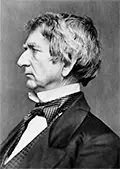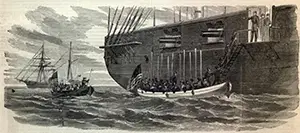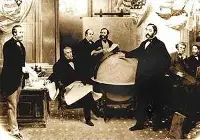William Seward: Lawyer, Lawmaker, Secretary of State
William Seward was a leading lawmaker and antislavery crusader who was most well-known for serving as Secretary of State during the Civil War. 
He was born on May 16, 1801, in Florida, N.Y. He attended Farmers' Hall Academy and then went to Union College, in Schenectady, N.Y., graduating in 1820. He studied law, passed the bar exam in 1823, and then joined a prominent Auburn, N.Y., law firm. He later married Frances Miller, the daughter of his senior law partner, Elijah Miller. Seward's father, noted businessman Samuel Seward, had slaves. (New York did not outlaw slavery until 1827.) Young William went to school right alongside his father's child slaves. William befriended those children, and this informed the antislavery crusading that he undertook when he was older. His first role as an elected official was in the New York State Senate, to which he was elected in 1830. He served as Governor of New York from 1839 to 1842. In between those two periods of time, he worked for the Holland Land Company. Seward won election to the U.S. Senate in 1849 and became a national voice in favor of the abolition of slavery. Arguing that slavery on its face was immoral, he once referenced "a higher law than the Constitution." He spoke out against the Compromise of 1850 because it included a strong Fugitive Slave Law. He was still in the Senate in 1860 when he sought the Republican Party nomination for President. (A Whig when he entered the Senate, he became a Republican when the Whig Party dissolved.) He was considered by many to be the frontrunner for the nomination, but the Party convention instead chose Illinois lawyer and lawmaker Abraham Lincoln. Lincoln's election as President in 1860 resulted in the secession of seven Southern states and the formation of the Confederate States of America. In between those two events, Seward was one of a handful of politicians who worked behind the scenes to resolve the crisis. Lincoln nominated him to be Secretary of State on Dec. 28, 1860. During the Civil War, Seward worked hard diplomatically to prevent France, the United Kingdom, and other countries from trading with (legally or illegally) and recognizing the Confederacy as a sovereign nation. He succeeded in this endeavor, dealing a blow to the South's hopes for support from foreign lands. 
He was instrumental in smoothing over relations between his country and the U.K. in what was known as the Trent Affair. A U.S. Navy ship had boarded a U.K. ship in order to capture two Confederate envoys. The consequent Lyons-Seward Treaty (negotiated with U.K. Ambassador Richard Lyons) made it possible for either country to search a ship that looked to be carrying African slaves. He also took part, along with Lincoln, in the Hampton Roads Peace Conference, an attempt in early 1865 to find peace and common ground. Seward was also attacked on the night that Lincoln was assassinated. Unlike the President, Seward recovered from his wounds. He continued to serve as Secretary of State under Lincoln's successor, Andrew Johnson. 
Once the war had ended, Seward turned his attention to territorial acquisition. His most famous of these was the Alaska Purchase. Originally derided as "Seward's Folly," the purchase of the Alaska Territory proved prescient when first gold and then oil were discovered there. He tried as well to purchase the Virgin Islands and other Caribbean territories but was not successful. Seward left the State Department when Johnson left the White House and embarked on a world tour that included visits to a few continents and lasted more than a year. Seward and his wife had five children together and also adopted a child. They both wanted to see the end of slavery, although Frances wanted it to come more quickly than William did. Several sources say that they were involved in the Underground Railroad. William is known to have supported famous abolitionist Harriet Tubman in the purchase of a home in Auburn. He died on Oct. 10, 1872, in Auburn, N.Y.; he was 71. |
|
Social Studies for Kids
copyright 2002–2025
David White




